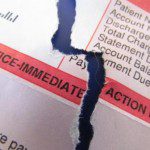
The point of filing a bankruptcy, most often, is to discharge debt. What debts are discharged and what debts are not?
A bankruptcy discharge means that the legal obligation to pay a debt is wiped away. For all intents and purposes, the debt is gone. This applies in a Chapter 7 to most unsecured, garden variety debt, such as credit card debt. However, certain types of debt are not dischargeable in a chapter Chapter 7 bankruptcy.
Debts Not Discharged:
- Debts resulting from fraud, misuse of funds, embezzlement, or larceny
- Debts that arise under false pretenses, including bogus representation, fraud, or false financial statements
- Debts for certain taxes
- Certain debts that result from the purchase of luxury merchandise or cash advances
- Obligations a debtor neglects to list in the bankruptcy schedules
- Liability for death or personal injury caused by operation of a motor vehicle while the operator was intoxicated from using alcohol, a drug, or another substance
- Alimony, child support, and other debts arising out of a divorce or separation
- Student loans (except in extremely unusual circumstances)
- Orders of restitution and debts resulting from willful and malicious injury
In Chapter 13 cases, and with a few exceptions, the debts addressed in the Chapter 13 plan will be discharged when all payments under the plan have been made, or in some cases, if the debtor qualifies for what is called a hardship discharge. Debts not discharged under Chapter 13 are:
- Criminal fines and restitution
- Obligations not listed on the debtor’s bankruptcy schedules
- Debts for spousal maintenance, alimony, and child support
- Student loans
- Debts related to drunk driving convictions
U.S. Bankruptcy Code section 523 provides exceptions to bankruptcy discharge. In extreme cases, section 727 denies discharge entirely where there has been conduct found to be an effort to hinder, delay or defraud creditors.
Filing bankruptcy presents many legal and procedural challenges. Don’t do it without retaining an experienced bankrptcy attorney. My office handles bankruptcy in New Hampshire and Massachusetts.
Views: 2




